莎士比亚 sonnet 18 29 66的中文翻译及评析
- 格式:doc
- 大小:31.00 KB
- 文档页数:3
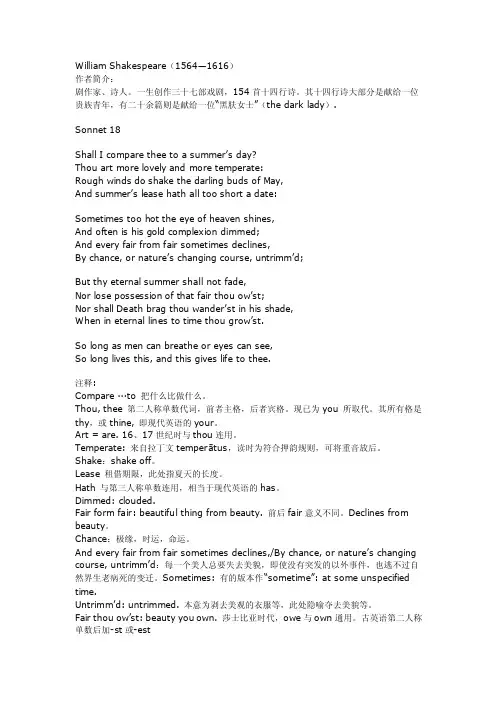
William Shakespeare(1564—1616)作者简介:剧作家、诗人。
一生创作三十七部戏剧,154首十四行诗。
其十四行诗大部分是献给一位贵族青年,有二十余篇则是献给一位“黑肤女士”(the dark lady).Sonnet 18Shall I compare thee to a summer’s day?Thou art more lovely and more temperate:Rough winds do shake the darling buds of May,A nd summer’s lease hath all too short a date:Sometimes too hot the eye of heaven shines,And often is his gold complexion dimmed;And every fair from fair sometimes declines,By chance, or nature’s changing course, untrimm’d;But thy eternal summer shall not fade,Nor lose possession of that fair thou ow’st;Nor shall Death brag thou wander’st in his shade,When in eternal lines to time thou grow’st.So long as men can breathe or eyes can see,So long lives this, and this gives life to thee.注释:Compare ···to 把什么比做什么。
Thou, thee 第二人称单数代词,前者主格,后者宾格。
现已为you 所取代。
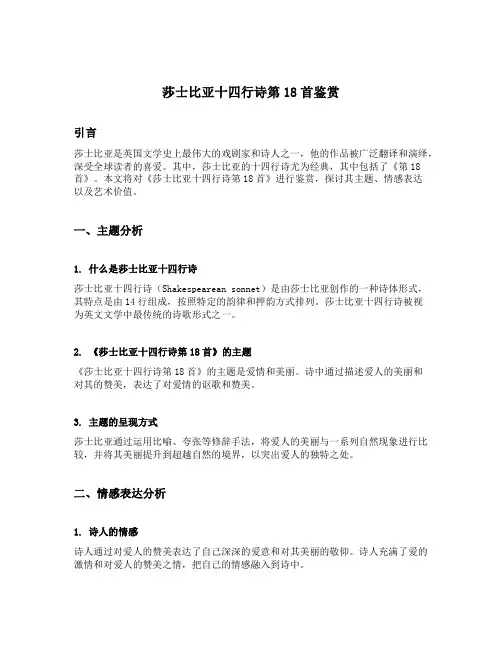
莎士比亚十四行诗第18首鉴赏引言莎士比亚是英国文学史上最伟大的戏剧家和诗人之一,他的作品被广泛翻译和演绎,深受全球读者的喜爱。
其中,莎士比亚的十四行诗尤为经典,其中包括了《第18首》。
本文将对《莎士比亚十四行诗第18首》进行鉴赏,探讨其主题、情感表达以及艺术价值。
一、主题分析1. 什么是莎士比亚十四行诗莎士比亚十四行诗(Shakespearean sonnet)是由莎士比亚创作的一种诗体形式,其特点是由14行组成,按照特定的韵律和押韵方式排列。
莎士比亚十四行诗被视为英文文学中最传统的诗歌形式之一。
2. 《莎士比亚十四行诗第18首》的主题《莎士比亚十四行诗第18首》的主题是爱情和美丽。
诗中通过描述爱人的美丽和对其的赞美,表达了对爱情的讴歌和赞美。
3. 主题的呈现方式莎士比亚通过运用比喻、夸张等修辞手法,将爱人的美丽与一系列自然现象进行比较,并将其美丽提升到超越自然的境界,以突出爱人的独特之处。
二、情感表达分析1. 诗人的情感诗人通过对爱人的赞美表达了自己深深的爱意和对其美丽的敬仰。
诗人充满了爱的激情和对爱人的赞美之情,把自己的情感融入到诗中。
2. 诗中情感的转折《莎士比亚十四行诗第18首》中情感经历了由赞美到忧伤的转折。
在诗的前几行,诗人对爱人进行了赞美,表达了自己对其美丽的深深敬仰之情。
然而,在诗的后半部分,情感转向了忧伤,诗人担心时间的流逝会将爱人的美丽消逝,这种忧伤的情感为整首诗增添了深刻的情感色彩。
三、艺术价值分析1. 诗歌运用的修辞手法《莎士比亚十四行诗第18首》使用了丰富多样的修辞手法,比如比喻、夸张、对比等,这些修辞手法使整首诗充满了艺术魅力,具有很高的艺术价值。
2. 渲染的意境诗中通过对爱人美丽的描绘和对时间流逝的担忧,营造了一种诗意的意境。
诗人通过对自然现象的描绘,将爱人的美丽与大自然相较,突出了爱人的独特之处,同时也增加了诗歌的艺术感染力。
3. 对爱情的思考《莎士比亚十四行诗第18首》可以说是对爱情最美丽和深刻的思考之一。
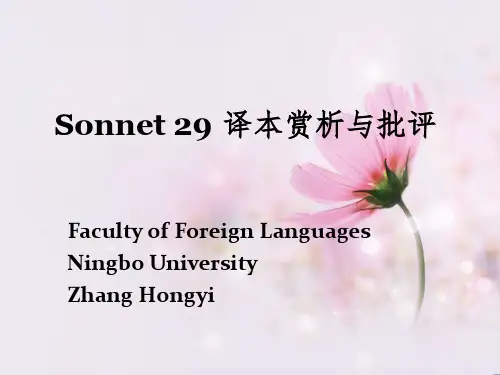
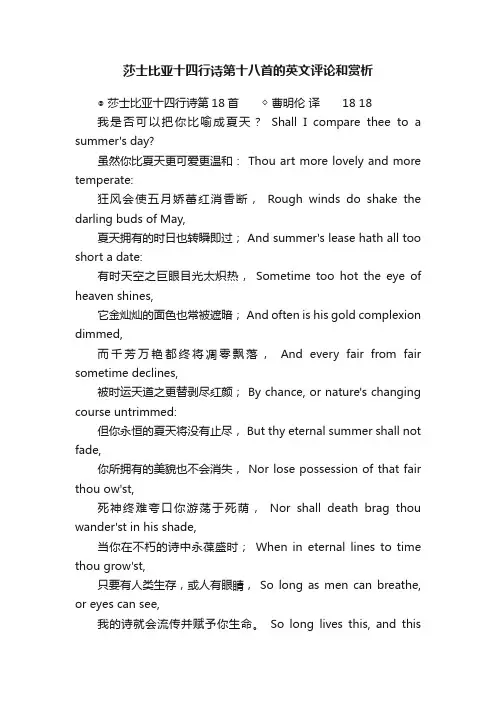
莎士比亚十四行诗第十八首的英文评论和赏析◎ 莎士比亚十四行诗第18首◇ 曹明伦译18 18我是否可以把你比喻成夏天?Shall I compare thee to a summer's day?虽然你比夏天更可爱更温和: Thou art more lovely and more temperate:狂风会使五月娇蕾红消香断,Rough winds do shake the darling buds of May,夏天拥有的时日也转瞬即过; And summer's lease hath all too short a date:有时天空之巨眼目光太炽热,Sometime too hot the eye of heaven shines,它金灿灿的面色也常被遮暗; And often is his gold complexion dimmed,而千芳万艳都终将凋零飘落,And every fair from fair sometime declines,被时运天道之更替剥尽红颜; By chance, or nature's changing course untrimmed:但你永恒的夏天将没有止尽, But thy eternal summer shall not fade,你所拥有的美貌也不会消失, Nor lose possession of that fair thou ow'st,死神终难夸口你游荡于死荫,Nor shall death brag thou wander'st in his shade,当你在不朽的诗中永葆盛时;When in eternal lines to time thou grow'st,只要有人类生存,或人有眼睛,So long as men can breathe, or eyes can see,我的诗就会流传并赋予你生命。
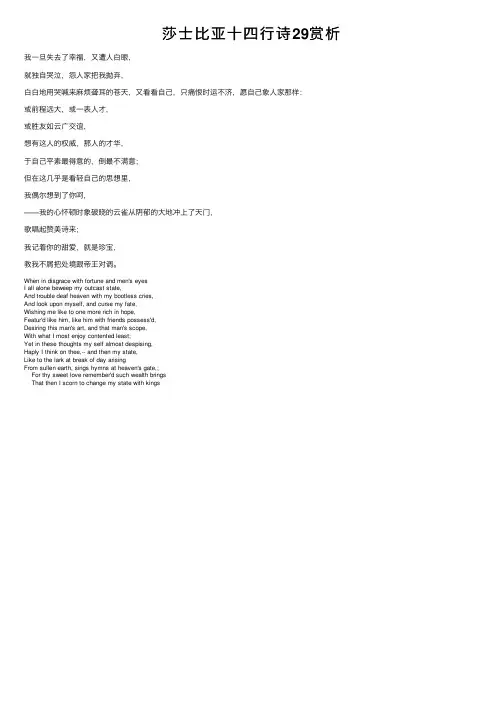
莎⼠⽐亚⼗四⾏诗29赏析我⼀旦失去了幸福,⼜遭⼈⽩眼,就独⾃哭泣,怨⼈家把我抛弃,⽩⽩地⽤哭喊来⿇烦聋⽿的苍天,⼜看看⾃⼰,只痛恨时运不济,愿⾃⼰象⼈家那样:或前程远⼤,或⼀表⼈才,或胜友如云⼴交谊,想有这⼈的权威,那⼈的才华,于⾃⼰平素最得意的,倒最不满意;但在这⼏乎是看轻⾃⼰的思想⾥,我偶尔想到了你呵,——我的⼼怀顿时象破晓的云雀从阴郁的⼤地冲上了天门,歌唱起赞美诗来;我记着你的甜爱,就是珍宝,教我不屑把处境跟帝王对调。
When in disgrace with fortune and men's eyesI all alone beweep my outcast state,And trouble deaf heaven with my bootless cries,And look upon myself, and curse my fate,Wishing me like to one more rich in hope,Featur'd like him, like him with friends possess'd,Desiring this man's art, and that man's scope,With what I most enjoy contented least;Yet in these thoughts my self almost despising,Haply I think on thee,-- and then my state,Like to the lark at break of day arisingFrom sullen earth, sings hymns at heaven's gate,;For thy sweet love remember'd such wealth bringsThat then I scorn to change my state with kings。
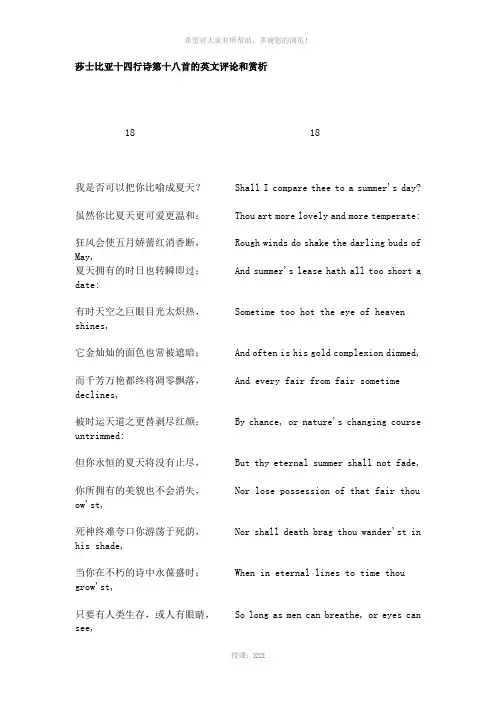
莎士比亚十四行诗第十八首的英文评论和赏析18 18我是否可以把你比喻成夏天? Shall I compare thee to a summer's day?虽然你比夏天更可爱更温和: Thou art more lovely and more temperate:狂风会使五月娇蕾红消香断, Rough winds do shake the darling buds of May,夏天拥有的时日也转瞬即过; And summer's lease hath all too short a date:有时天空之巨眼目光太炽热, Sometime too hot the eye of heaven shines,它金灿灿的面色也常被遮暗; And often is his gold complexion dimmed,而千芳万艳都终将凋零飘落, And every fair from fair sometime declines,被时运天道之更替剥尽红颜; By chance, or nature's changing course untrimmed:但你永恒的夏天将没有止尽, But thy eternal summer shall not fade,你所拥有的美貌也不会消失, Nor lose possession of that fair thou ow'st,死神终难夸口你游荡于死荫, Nor shall death brag thou wander'st in his shade,当你在不朽的诗中永葆盛时; When in eternal lines to time thou grow'st,只要有人类生存,或人有眼睛, So long as men can breathe, or eyes can see,我的诗就会流传并赋予你生命。
So long lives this, and this gives life to thee.注:第11行语出《旧约•诗篇》第23篇第4节:“虽然我穿行于死荫之幽谷,但我不怕罹祸,因为你与我同在……”英文赏析:This is one of the most famous of all the sonnets, justifiably so. But it would be a mistake to take it entirely in isolation, for it links in with so many of the other sonnets through the themes of the descriptive power of verse; the ability of the poet to depict the fair youth adequately, or not; and the immortality conveyed through being hymned in these 'eternal lines'. It is noticeable that here the poet is full of confidence that his verse will live as long as there are people drawing breath upon the earth, whereas later he apologises for his poor wit and his humble lines which are inadequate to encompass all the youth's excellence. Now, perhaps in the early days of his love, there is no such self-doubt and the eternal summer of the youth is preserved forever in the poet's lines. The poem also works at a rather curious level of achieving its objective through dispraise. The summer's day is found to be lacking in so many respects (too short, too hot, too rough, sometimes too dingy), but curiously enough one is left with the abiding impression that 'the lovely boy' is in fact like a summer's day at its best, fair, warm, sunny, temperate, one of the darling buds of May, and that all his beauty has been wonderfully highlighted by the comparison。
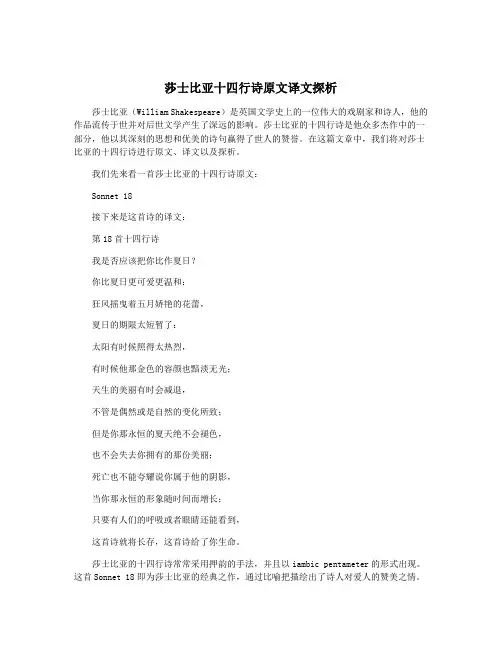
莎士比亚十四行诗原文译文探析莎士比亚(William Shakespeare)是英国文学史上的一位伟大的戏剧家和诗人,他的作品流传于世并对后世文学产生了深远的影响。
莎士比亚的十四行诗是他众多杰作中的一部分,他以其深刻的思想和优美的诗句赢得了世人的赞誉。
在这篇文章中,我们将对莎士比亚的十四行诗进行原文、译文以及探析。
我们先来看一首莎士比亚的十四行诗原文:Sonnet 18接下来是这首诗的译文:第18首十四行诗我是否应该把你比作夏日?你比夏日更可爱更温和:狂风摇曳着五月娇艳的花蕾,夏日的期限太短暂了:太阳有时候照得太热烈,有时候他那金色的容颜也黯淡无光;天生的美丽有时会减退,不管是偶然或是自然的变化所致;但是你那永恒的夏天绝不会褪色,也不会失去你拥有的那份美丽;死亡也不能夸耀说你属于他的阴影,当你那永恒的形象随时间而增长;只要有人们的呼吸或者眼睛还能看到,这首诗就将长存,这首诗给了你生命。
莎士比亚的十四行诗常常采用押韵的手法,并且以iambic pentameter的形式出现。
这首Sonnet 18即为莎士比亚的经典之作,通过比喻把描绘出了诗人对爱人的赞美之情。
诗的开篇即以修辞设问来呈现,作者在问自己是否应该将心上人比作夏日,然后通过下文的赞美,表达出对心上人更为深切的赞美之情。
他认为心上人的美丽胜过夏日,夏日虽然美丽,却不如心上人温和可爱。
由此,诗中呈现了作者对心上人的赞美之情。
在诗的后半部分,诗人使用了“永恒的夏天”来包含对心上人的赞美之语,不管是风吹雨打,都不会改变。
随后,诗人再以修辞手法呼唤死亡无法摧毁对心上人的赞美之情,并肯定了这份美丽将长存与时间,给了心上人永生。
通过以上对原文和译文的对比分析,我们不难发现莎士比亚的十四行诗所蕴含的深刻情感。
诗人通过对夏日和心上人的比较,抒发了对心上人深切的赞美之情,并以永恒的夏天来喻示继续深切的情感长存。
这首诗也正是莎士比亚情感抒发的一个缩影,其深情款款的语言和艺术手法让我们感受到了莎士比亚伟大的文学魅力。
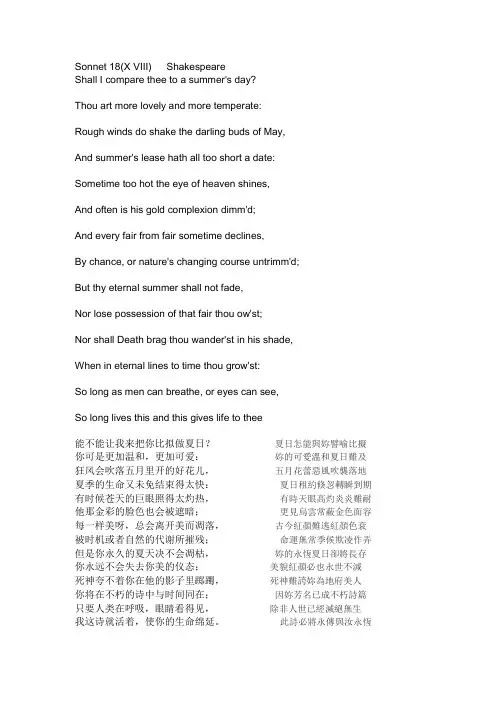
Sonnet 18(X VIII) ShakespeareShall I compare thee to a summer's day?Thou art more lovely and more temperate:Rough winds do shake the darling buds of May,And summer's lease hath all too short a date:Sometime too hot the eye of heaven shines,And often is his gold complexion dimm'd;And every fair from fair sometime declines,By chance, or nature's changing course untrimm'd;But thy eternal summer shall not fade,Nor lose possession of that fair thou ow'st;Nor shall Death brag thou wander'st in his shade,When in eternal lines to time thou grow'st:So long as men can breathe, or eyes can see,So long lives this and this gives life to thee能不能让我来把你比拟做夏日?夏日怎能與妳譬喻比擬你可是更加温和,更加可爱:妳的可愛溫和夏日難及狂风会吹落五月里开的好花儿,五月花蕾惡風吹襲落地夏季的生命又未免结束得太快:夏日租約倏忽轉瞬到期有时候苍天的巨眼照得太灼热,有時天眼高灼炎炎難耐他那金彩的脸色也会被遮暗;更見烏雲常蔽金色面容每一样美呀,总会离开美而凋落,古今紅顏難逃紅顏色衰被时机或者自然的代谢所摧残;命運無常季候欺凌作弄但是你永久的夏天决不会凋枯,妳的永恆夏日卻將長存你永远不会失去你美的仪态;美貌紅顏必也永世不減死神夸不着你在他的影子里踯躅,死神難誇妳為地府美人你将在不朽的诗中与时间同在;因妳芳名已成不朽詩篇只要人类在呼吸,眼睛看得见,除非人世已經滅絕無生我这诗就活着,使你的生命绵延。
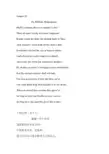
Sonnet 18By William ShakespeareShall I compare thee to a summer’s day?Thou art more lovely and more temperate: Rough winds do shake the darling buds of May, And summer’s lease hath all too short a date: Sometimes too hot the eye of heaven shinesAnd often is his gold complexion dimed;And every fair form fair sometimes declines,By chance or nature’s changing course untrimmed; But thy eternal summer shall not fade,Nor lose possession of that fair thou ow’st;Nor shall death brag thou wander’st in his shade. When in eternal lines to time thou grow’st:So long as men can breathe,or eyes can see,So long lives this,and this gives life to thee.十四行诗(其十八)威廉·莎士比亚我能把你比作夏日吗?尽管你更可爱、更温和;夏日的狂风可能会摧残五月的花儿,季节的限制又减少了可拥有的日光;天空的巨眼有时过于灼热,常使自身的辉煌无故湮没;每一种美都会消逝,不管愿意或是无奈;然而你这盛夏将永存不朽,连你所有的美都不会褪去;死神不忍逼近,生命只会长存;只要人类能呼吸,能看见;我的诗就会存在,而你的生命也会延续。
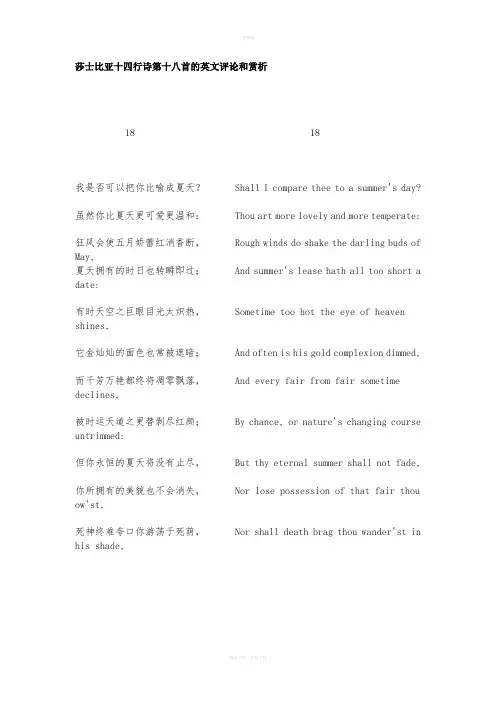
莎士比亚十四行诗第十八首的英文评论和赏析18 18我是否可以把你比喻成夏天? Shall I compare thee to a summer's day?虽然你比夏天更可爱更温和: Thou art more lovely and more temperate:狂风会使五月娇蕾红消香断, Rough winds do shake the darling buds of May,夏天拥有的时日也转瞬即过; And summer's lease hath all too short a date:有时天空之巨眼目光太炽热, Sometime too hot the eye of heaven shines,它金灿灿的面色也常被遮暗; And often is his gold complexion dimmed,而千芳万艳都终将凋零飘落, And every fair from fair sometime declines,被时运天道之更替剥尽红颜; By chance, or nature's changing course untrimmed:但你永恒的夏天将没有止尽, But thy eternal summer shall not fade,你所拥有的美貌也不会消失, Nor lose possession of that fair thou ow'st,死神终难夸口你游荡于死荫, Nor shall death brag thou wander'st in his shade,当你在不朽的诗中永葆盛时; When in eternal lines to time thou grow'st,只要有人类生存,或人有眼睛, So long as men can breathe, or eyes can see,我的诗就会流传并赋予你生命。
So long lives this, and this gives life to thee.注:第11行语出《旧约•诗篇》第23篇第4节:“虽然我穿行于死荫之幽谷,但我不怕罹祸,因为你与我同在……”英文赏析:This is one of the most famous of all the sonnets, justifiably so. But it would be a mistake to take it entirely in isolation, for it links in with so many of the other sonnets through the themes of the descriptive power of verse; the ability of the poet to depict the fair youth adequately, or not; and the immortality conveyed through being hymned in these 'eternal lines'. It is noticeable that here the poet is full of confidence that his verse will live as long as there are people drawing breath upon the earth, whereas later he apologises for his poor wit and his humble lines which are inadequate to encompass all the youth's excellence. Now, perhaps in the early days of his love, there is no such self-doubt and the eternal summer of the youth is preserved forever in the poet's lines. The poem also works at a rather curious level of achieving its objective through dispraise. The summer's day is found to be lacking in so many respects (too short, too hot, too rough, sometimes too dingy), but curiously enough one is left with the abiding impression that 'the lovely boy' is in fact like a summer's day at its best, fair, warm, sunny, temperate, one of the darling buds of May, and that all his beauty has been wonderfully highlighted by the comparison。
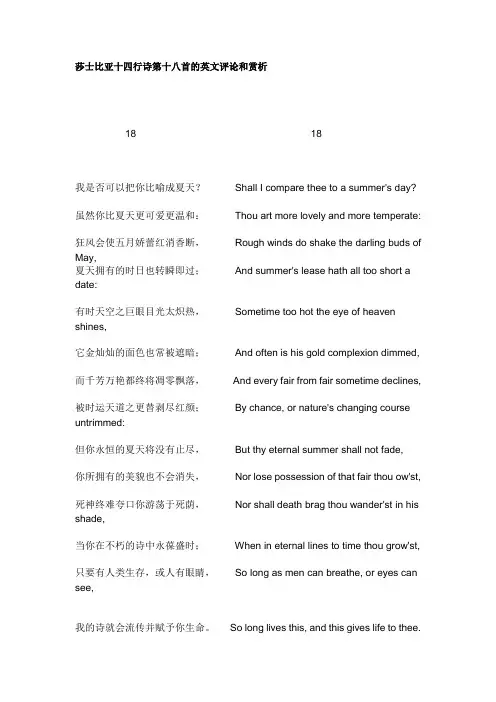
莎士比亚十四行诗第十八首的英文评论和赏析18 18我是否可以把你比喻成夏天?Shall I compare thee to a summer's day?虽然你比夏天更可爱更温和:Thou art more lovely and more temperate:狂风会使五月娇蕾红消香断,Rough winds do shake the darling buds of May,夏天拥有的时日也转瞬即过;And summer's lease hath all too short a date:有时天空之巨眼目光太炽热,Sometime too hot the eye of heaven shines,它金灿灿的面色也常被遮暗;And often is his gold complexion dimmed, 而千芳万艳都终将凋零飘落,And every fair from fair sometime declines,被时运天道之更替剥尽红颜;By chance, or nature's changing course untrimmed:但你永恒的夏天将没有止尽,But thy eternal summer shall not fade,你所拥有的美貌也不会消失,Nor lose possession of that fair thou ow'st,死神终难夸口你游荡于死荫,Nor shall death brag thou wander'st in his shade,当你在不朽的诗中永葆盛时;When in eternal lines to time thou grow'st,只要有人类生存,或人有眼睛,So long as men can breathe, or eyes can see,我的诗就会流传并赋予你生命。
So long lives this, and this gives life to thee.注:第11行语出《旧约•诗篇》第23篇第4节:“虽然我穿行于死荫之幽谷,但我不怕罹祸,因为你与我同在……”英文赏析:This is one of the most famous of all the sonnets, justifiably so. But it would be a mistake to take it entirely in isolation, for it links in with so many of the other sonnets through the themes of the descriptive power of verse; the ability of the poet to depict the fair youth adequately, or not; and the immortality conveyed through being hymned in these 'eternal lines'. It is noticeable that here the poet is full of confidence that his verse will live as long as there are people drawing breath upon the earth, whereas later he apologises for his poor wit and his humble lines which are inadequate to encompass all the youth's excellence. Now, perhaps in the early days of his love, there is no such self-doubt and the eternal summer of the youth is preserved forever in the poet's lines. The poem also works at a rather curious level of achieving its objective through dispraise. The summer's day is found to be lacking in so many respects (too short, too hot, too rough, sometimes too dingy), but curiously enough one is left with the abiding impression that 'the lovely boy' is in fact like a summer's day at its best, fair, warm, sunny, temperate, one of the darling buds of May, and that all his beauty has been wonderfully highlighted by the comparison。
sonnet18诗歌解析莎士比亚的Sonnet 18是他最著名的十四行诗之一,也被称为“夏天之歌”。
这首诗是一首十四行抒情诗,采用了典型的莎士比亚十四行诗的结构,包括三个四行的四行诗和一个以两行组成的结尾的双行诗。
诗歌的主题是赞美诗人所爱的对象,并通过比喻夸赞她的美丽和永恒。
在这首诗中,诗人将他所爱的人比作夏天,但也指出夏天的美丽是短暂的,而她的美丽将永远存在下去。
首先,诗歌的开头两行“Shall I compare thee to a summer's day? / Thou art more lovely and more temperate:”表明了诗人要将他所爱的人与夏天进行对比,但随后他又指出她比夏天更可爱更温和。
这种对比突出了她的美丽和永恒。
其次,诗中提到“Rough winds do shake the darling buds of May,”这句话描绘了夏天的风暴和动荡,与此形成对比的是“Sometime too hot the eye of heaven shines”,表达了夏天的酷热。
这些描述强调了夏天的不稳定和短暂,与诗人所爱的人的美丽形成了对比。
此外,诗中还提到“But thy eternal summer shall notfade”,这句话表达了诗人对所爱人美丽永恒的信念,即使时间流逝,她的美丽也不会凋谢。
最后,诗歌的结尾两行“So long as men can breathe oreyes can see, / So long lives this, and this gives life to thee.”表达了诗人的信念,即只要人类存在,这首诗也将永存下去,而她的美丽也将因此而得以永生。
总的来说,Sonnet 18是一首赞美之歌,通过对比夏天的短暂和变化与所爱人的永恒美丽,表达了诗人对所爱人的赞美和珍视之情。
这首诗以其优美的语言和深刻的意境,成为了莎士比亚诗歌中的经典之作。
莎士比亚诗歌《十四行诗第十八首》原文及赏析(最新版)编制人:__________________审核人:__________________审批人:__________________编制单位:__________________编制时间:____年____月____日序言下载提示:该文档是本店铺精心编制而成的,希望大家下载后,能够帮助大家解决实际问题。
文档下载后可定制修改,请根据实际需要进行调整和使用,谢谢!并且,本店铺为大家提供各种类型的经典范文,如诗歌散文、原文赏析、读书笔记、经典名著、古典文学、网络文学、经典语录、童话故事、心得体会、其他范文等等,想了解不同范文格式和写法,敬请关注!Download tips: This document is carefully compiled by this editor.I hope that after you download it, it can help you solve practical problems. The document can be customized and modified after downloading, please adjust and use it according to actual needs, thank you!In addition, this shop provides you with various types of classic sample essays, such as poetry and prose, original text appreciation, reading notes, classic works, classical literature, online literature, classic quotations, fairy tales, experience, other sample essays, etc. if you want to know the difference Please pay attention to the format and writing of the sample essay!莎士比亚诗歌《十四行诗第十八首》原文及赏析【导语】:我怎样能把你比做夏天? 你比它更可爱也更温和; 五月的娇蕾有暴风震颠, 夏季的寿命很短就度过。
莎士比亚十四行诗sonnet 18译文比较研究莎士比亚的十四行诗sonnet 18是一首经典的爱情诗,其中描述了莎士比亚对一位美丽的女子的爱慕之情。
下面是这首诗的英文原文和中文译文:英文原文:Shall I compare thee to a summer's day?Thou art more lovely and more temperate.Rough winds do shake the darling buds of May,And summer's lease hath all too short a date.Sometime too hot the eye of heaven shines,And often is his gold complexion dimm'd;And every fair from fair sometime declines,By chance, or nature's changing course untrimm'd;But thy eternal beauty shall not fadeNor lose possession of that fair thou owest;Nor shall Death brag thou wander'st in his shade,When in eternal lines to time thou growest:So long as men can breathe or eyes can see,So long lives this, and this gives life to thee.中文译文:我可以把你比作一个夏日吗?你更加可爱,更加温和。
五月里,狂风摇晃着娇贵的花蕾,夏天的收益只有短暂的期限。
有时太阳的眼睛灼热地闪耀,经常他的金色肤色变得黯淡;美女们都有时会衰顿,不是因为命运,就是因为自然的变化;但是你永恒的美丽不会消逝,也不会失去那份你应有的美丽;死亡也不会夸耀说你走进他的阴影,当你在永恒的诗句中与时光同长:只要人们还能呼吸或眼睛能看见,这首诗就会存在,并为你增添生命。
莎士比亚十四行诗_Sonnet_18
莎士比亚的十四行诗《Sonnet 18》是一个典型的爱情诗歌,描绘了一个男人对他所爱的女人的深情表达。
这首诗非常有名,因为它的语言优美,情感深沉,而且它以一种独特的方式表达爱情。
诗歌开头,莎士比亚问:“夏天真是如此美好吗?”然后他列举了夏季的缺点,如小鸟走失和温暖的天气过快地消退。
接着,莎士比亚把夏天和他所爱的女人相比较,认为她比夏天更美,更可爱。
“但我亲爱的比这夏季更加美好,更加温暖。
”他写道。
在诗的下半部分,莎士比亚继续表达他对这个女人的爱。
他说,即使时间流逝,这个女人的美貌也不会消失。
他写道,“你的美丽将永存于此,并且你的一切将继续存留在我记忆之中。
”
莎士比亚通过诗歌来赞美他所爱的女人,措辞优美,充满感情。
他把夏季的短暂和不稳定与他所爱的女人的美丽和稳定相比较,强调了他的爱情之深。
诗歌的最后两行是著名的,“你的美貌将永垂不朽”,这表明这个女人在他心中的位置是不会改变的。
总之,莎士比亚的十四行诗《Sonnet 18》表达了一种深情的爱情,是被人们广泛引用的经典之作。
它展现了莎士比亚的语言造诣和文学天赋,更引领了爱情诗歌的一股风潮。
莎士比亚sonnet18赏析解析莎士比亚十四行诗的主题莎士比亚毕生创作了大量杰出的文学作品。
他的喜剧和悲剧被认为是世界文学宝库中不可多得的瑰宝,但从本质上来说,莎士比亚首先是一个诗人,他的剧本,很大部分是用诗体――主要是无韵诗体写成的。
莎士比亚的诗歌成就最高的是十四行诗,总共154首。
莎士比亚热情讴歌了友谊和爱,青春和美;他们所包含的不仅是感情,还有诗人深邃的思想。
莎士比亚的十四行诗主要涉及三个人物:诗人、“年轻朋友”和“黑肤女郎”,大体分为三部分。
第一部分1―126首是诗人献给一位“年轻朋友”,他称之为“爱友”的人。
在这126首诗中,诗人热情讴歌了“年轻朋友”的美貌、聪慧、高贵和真挚(1―99),指责了他的多疑和反复无常(100―125)。
第二部分从第127首至第152首,是献给“黑肤女郎”的。
在这一部分中,诗人表达了自己对她真挚的爱情,同时也责备了她的轻浮和放荡。
最后两首诗,诗人引用希腊神话赞美爱情,可以看作是127―152首诗的终曲。
十四行诗丰富的内容交织着深刻的内心体验、精妙的意象、以及色彩斑斓的社会生活和社会风俗,充分反映了莎士比亚的人文思想。
文艺复兴时期的人文主义者反对中世纪的禁欲主义、等级制度和神权制度,赞美人的价值、尊重人的个性。
在十四行诗中,诗人热情地赞颂人的美,在他眼中,“年轻朋友”就是所有美的化身,夏日、太阳、花朵、春天、收获都用来描述“朋友”的美。
在诗人眼中,“爱友”被赋予了自然中所有的美:“一切天生的俊秀都蕴含着你”(第53首)。
然而,美并不是孤立存在的。
莎士比亚认为要区分“内心的美”和“外貌的姣好”(第16首),真正的美在于二者的结合。
他谴责那些外表美丽却心灵肮脏的人,认为他们是“烂百合花”,“最贱的野草也比它高贵得多”(第94首)。
诗人不但赞颂人的美,还赞颂人的永恒。
在十四行诗中,莎士比亚经常提到时间,认为它是青春和美丽不共戴天的敌人。
因为时间“要把你青春的白昼化作黑夜”(第15首),所以美会变丑、生命会终结。
莎士比亚的Sonnet 18英汉对照Shall I compare thee to a summer’s day?可否让我把你比作夏天?Thou art more lovely and more temperate:你比夏天更加可爱,更加温婉;Rough winds do shake the darling buds of May, 大风摇落了五月鲜嫩的蓓蕾,And summer’s lease hath all too short a date:夏季的时日不长,即将届满;Sometime too hot the eye of heaven shines,有时太阳的烈眼会咄咄逼人,And often is his gold complexion dimm’d;他金黄的面孔时常会变得暗淡;And every fair from fair sometime declines,每一种艳丽都有凋谢之时日,By chance or nature’s changing course untrimm’d 或者由于无常,或者因为自然。
But thy eternal summer shall not fade可你如永恒的夏日,不会凋凌,Nor lose possession of that fair thou owest;你的美丽永存,依然风度翩翩;Nor shall Death brag thou wander’st in his shade,死神的遮蔽不过是它的夸口When in eternal lines to time thou growest:不朽的诗行将记录你的娇妍。
So long as men can breathe or eyes can see,只要有人一息尚存、双眸能视,So long lives this and this gives life to thee.这首小诗就会留芳,赐你生机无限。
18莎士比亚的十四行诗总体上表现了一个思想:爱征服一切。
他的诗充分肯定了人的价值、赞颂了人的尊严、个人的理性作用。
诗人将抽象的概念转化成具体的形象,用可感可见的物质世界,形象生动地阐释了人文主义的命题。
诗的开头将“你”和夏天相比较。
自然界的夏天正处在绿的世界中,万物繁茂地生长着,繁阴遮地,是自然界的生命最昌盛的时刻。
那醉人的绿与鲜艳的花一道,将夏天打扮得五彩缤纷、艳丽动人。
但是,“你”却比夏天可爱多了,比夏天还要温婉。
五月的狂风会作践那可爱的景色,夏天的期限太短,阳光酷热地照射在繁阴班驳的大地上,那熠熠生辉的美丽不免要在时间的流动中凋残。
这自然界最美的季节和“你”相比也要逊色不少。
而“你”能克服这些自然界的不足。
“你”在最灿烂的季节不会凋谢,甚至“你”美的任何东西都不会有所损失。
“你”是人世的永恒,“你”会让死神的黑影在遥远的地方停留,任由死神的夸口也不会死去。
“你”是什么?“你”与人类同在,你在时间的长河里不朽。
那人类精神的精华——诗,是你的形体吗?或者,你就是诗的精神,就是人类的灵魂。
诗歌在形式上一改传统的意大利十四行诗四四三三体,而是采用了四四四二体:在前面充分地发挥表达的层次,在充分的铺垫之后,用两句诗结束全诗,点明主题。
全诗用新颖巧妙的比喻,华美而恰当的修饰使人物形象鲜明、生气鲜活。
诗人用形象的表达使严谨的逻辑推理变得生动有趣、曲折跌宕,最终巧妙地得出了人文主义的结论。
二十九首就是其中的一首。
这首诗热情地歌颂爱情,诗人在创作这首诗
时,充分发挥了十四行诗的长处,采用了“先抑后
扬”手法,层层推进,波澜起伏,道出了诗人的思想
感情发展变化过程,开头四句这样写道:
When ,in disgrace with Fortune and men’ eyes ,
s
I all alone beweep my outcast state ,
And trouble deaf heaven with my bootless cries ,
And look upon myself ,and curse my fate ,
从这四句我们可以读出,一开始诗人悲悲切切地
唱出自己的悲惨处境“in disgrace with Fortune and
,
men’ eyes (失去了幸福,又遭人白眼。
”,慨叹自
s )
己生不逢时,身世凋零。
幸福已离他远去,即便是“cries (哭喊)”也是“bootless (无用的)”,不过是“trouble(麻烦)”“deafheaven(聋耳的苍天)”,真是叫
天天不应,叫地地不灵,诗人只有“curse my fate(悲叹时运不济)”。
接着四句诗人更进一步吐露自己
心中的自卑:
Wishing me like to one more rich in hope , Featured like him ,like him with friends possessed , Desiring this man’s art and that man’s scope ,
With what I most enjoy contented least ,
诗人羡慕人家“rich in hope(前程远大)”“Featured , (一表人才) ”“ , with friends possessed (盛友如云) ” “Desiring(渴望有)”别人的“art (权威)”“scope (才, 华)”。
同这许多人相比,诗人觉得自惭形秽,痛苦悲伤,感觉自己一无是处,尤其的看轻自己“With , what I most enjoy contented least (于自己平素最得意的[指吟诗] ,倒最不满意)”,这四句诗真是把诗人
的怨天尤人,痛苦万状的情绪推到了极点。
可是
接着四句,诗人笔锋一转,整个诗的情调骤然改变,
Yet in these thoughts myself almost despising , Haply I think on thee ,and then my state ,
Like to the lark at break of day arising
From sullen earth ,sings hymns at heaven’ gate ;
s
从这四句可以看出,诗人因为“think on thee (想到了你)”而突然间精神振奋,神采飞扬,先前所有的忧郁一扫而空,刹那间喜上心头,唱出了喜悦的欢歌“Like to the lark at break of day arising/ From
,
sullen earth ,sings hymns at he aven’s gate ; (顿时像破晓的云雀从阴郁的大地冲上了天门,歌唱起赞美
诗来。
”“thee”就是“爱”,是“thee”扭转了诗人心
) ,
中的乾坤,最后,诗人极其豪迈的唱到:
For thy sweet love rememb ’red such wealth
brings ,
That then I scorn to change my state with kings.
这两个警句,画龙点睛地总结了全篇,也是诗人一贯的作法,与开头形成鲜明的对照。
从而可以看出,诗人作这首诗经历了从消极到振奋,从忧郁到欢喜,从自卑到自豪,这一系列的变化,全都是因为“thee”,也是“爱”给了诗人强大的鼓舞力量,给
了诗人莫大的勇气,信心和希望,使诗人放弃自
卑“That then I scorn to change my state with kings. ,
(教我不屑把处境跟帝王对调。
”这也正是本诗的) 主题。
“sweet love(甜爱)”究竟为何物? 为什么诗人
一想到“thee”的“sweet love”,就会阴郁一扫而空, 心境顿时明朗开阔。
作者以为“sweet love”就是崇高的友谊,坚贞的爱情,在困难的时候,他们会给人鼓舞的力量。
66
厌了这一切,我向安息的死疾呼,
比方,眼见天才注定做叫化子,
无聊的草包打扮得衣冠楚楚,
纯洁的信义不幸而被人背弃,
金冠可耻地戴在行尸的头上,
处女的贞操遭受暴徒的玷辱,
严肃的正义被人非法地诟让,
壮士被当权的跛子弄成残缺,
愚蠢摆起博士架子驾驭才能,
艺术被官府统治得结舌箝口,
淳朴的真诚被人瞎称为愚笨,
囚徒"善"不得不把统帅"恶"伺候:
厌了这一切,我要离开人寰,
但,我一死,我的爱人便孤单。